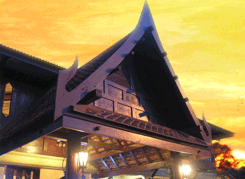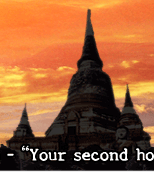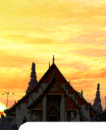





Wat Phra Si Sanphet
In 1491, Wat Phra Si Sanphet was located inside the compound of
the Grand Palace-the foundations of which are still visible-and
served as the royal chapel, as Wat Phra Kaeo does in Bangkok. This
Wang Lung Palace (Royal Palace) was built by King U-Thong upon the
founding of the city. Used as a residential palace, it became a
monastery in the reign of King Ramathibodi I. When King Borom Trai
Lokanat commanded the construction of new living quarters, this
residential palace was transformed into a temple,and the establishment
of Wat Phra Si Sanphet. In Ayutthaya's heyday, this was the largest
temple in the city. The three main chedis which have been restored
contain the ashes of three Ayutthaya kings. The temple is situated
at the northern end of Si Sanphet Road. The royal chapel does not
have any monks and novice inhabitants. Admission fee is 20 bahts.
In 1491, Wat Phra Si Sanphet was located inside the compound of
the Grand Palace-the foundations of which are still visible-and
served as the royal chapel, as Wat Phra Kaeo does in Bangkok. This
Wang Lung Palace (Royal Palace) was built by King U-Thong upon the
founding of the city. Used as a residential palace, it became a
monastery in the reign of King Ramathibodi I. When King Borom Trai
Lokanat commanded the construction of new living quarters, this
residential palace was transformed into a temple,and the establishment
of Wat Phra Si Sanphet. In Ayutthaya’s heyday, this was the largest
temple in the city.
The three main chedis which have been restored contain the ashes
of three Ayutthaya kings. The temple is situated at the northern
end of Si Sanphet Road. The royal chapel does not have any monks
and novice inhabitants.
Luang Chumni Village : Bed and
Breakfast ( B&B ) in Ayutthaya, Thailand
|












